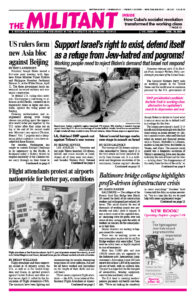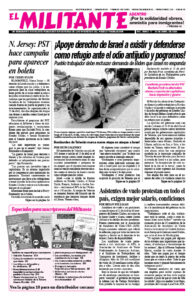MEMPHIS, Tenn. — After almost 10 months of a hard-fought strike battle, members of the Bakery, Confectionery, Tobacco Workers and Grain Millers Local 390G at International Flavors and Fragrances here decided March 28 to return to work and continue their fight inside the plant.
They are now working under the “last, best and final offer” from the company, which had been voted down by the membership last June.
The imposed conditions include an end to paid lunch breaks, no overtime pay after eight hours, and a cut in contributions to workers’ 401(k) retirement plans. Health care costs went up dramatically after the company changed insurers three years ago after merging with Dupont.
“It’s not over, we’re still in the fight,” maintenance worker Andrew Peña said. Peña, Clarence Terry, a union member who has just returned to work, and Cedric Wilson, a dryer operator and president of Local 390G, met with Militant worker-correspondents April 10 to discuss their fight. Also joining the discussion was Kayla Chunn, Peña’s fiancée and an active strike supporter.
Terry reported not much new production has begun yet and the company has had returning workers completing computer training modules before they start back on their old jobs.
Some 200 union members went on strike last June when the company refused to bargain. About 100 workers were still on strike when they decided to return to work. As the company calls back union members it continues to employ replacement workers hired during the walkout.
“We made the decision to go back unconditionally because the National Labor Relations Board said it wouldn’t consider the 13 charges we made against the company until we agreed to return,” Wilson said. “More people were crossing the picket line and others were taking other jobs.”
The union has a tentative agreement from the company to begin negotiations again around the end of April.
Workers at International Flavors and Fragrances make soy protein products that are used in baby formula, pet foods and nutritional powders. IFF is an international conglomerate, with 158 plants and 51 laboratories worldwide. Bosses raked in $11.7 billion in profits in 2021.
“I wouldn’t call this a win yet, but it’s not a loss either,” said Wilson, “It’s not over. They didn’t think we would put up a fight and we did. The company put all its eggs into getting rid of the union and they weren’t able to.
“Folks who crossed the line or who went to other jobs now have a better understanding of what it’s like to not have a union,” he added. “We can win these people to be union supporters.”
A drive in December raised thousands of dollars to give out toys to the children and grandchildren of strikers. “It was really successful and we appreciated all the support,” IFF lab worker Glenda Sumner told the Militant. She hasn’t been called back to work yet.
Local 390G won widespread support for its strike from many other workers and area civil rights organizations. The picket line was visited by BCTGM members from 12 different states, as well as local members from Kellogg’s and from Blues City Brewery. Other supporters sent donations and solidarity messages.
A conference of Dominican and Haitian sugarcane worker unionists sent a solidarity message to the strike.
Members of United Auto Workers Local 2406 who work at the GM parts warehouse here came by the picket line regularly and the two unions held a joint rally when the UAW members walked out as part of the nationwide auto strike.
Other labor battles continue in the area. Local 2406 members at the huge Daimler truck parts warehouse here are part of the company’s 7,000 workers nationwide. The UAW members voted by 96% to strike if a new contract isn’t reached by April 26.
Ned Measel contributed to this article.

